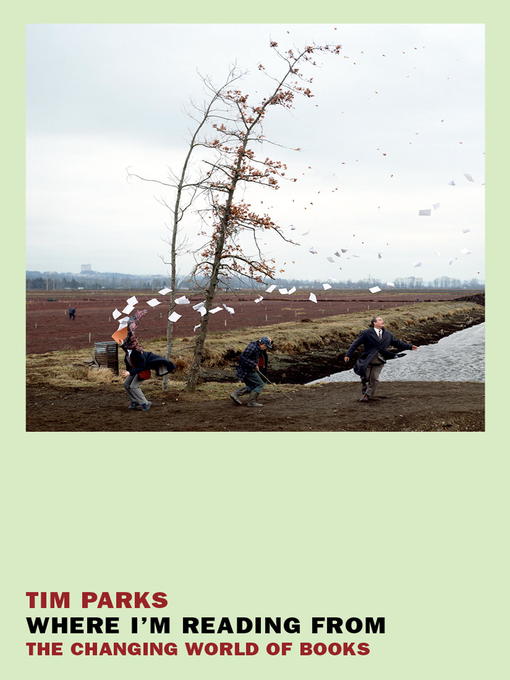
Where I'm Reading From
The Changing World of Books
کتاب های مرتبط
- اطلاعات
- نقد و بررسی
- دیدگاه کاربران
نقد و بررسی

February 23, 2015
In this lively collection of 37 essays, novelist (Painting Death) and translator Parks, who is also one of the most eloquent and provocative critics, explores a range of topics in contemporary literature and publishing in essays with titles such as “Do We Need Stories?,” “The Dull New Global Novel,” “Does Money Make Us Better Writers?,” “Why Readers Disagree,” and “Translating in the Dark.” Parks ponders the ways that translating a text challenges both readers and translators, observing that the act of moving a text from one language to another allows for better understanding of it. Elsewhere, he points out that creative writing programs seldom serve the function of teaching students how to write, instead advancing their careers by introducing them to established writers so they can make valuable professional connections. In a brilliant take on copyright, he notes that the concept is not “essentially driven by notions of justice or theories of ownership, but by a certain culture’s attachment to a certain literary form.” As the character of the printed word and the nature of reading continue to change, Parks’s essays probe the positive and negative effects of these changes for our reading lives.

March 1, 2015
Why do books matter?British novelist, essayist, translator, and critic Parks (Italian Ways: On and Off the Rails from Milan to Palermo, 2013, etc.) considers the current state of writing and reading in short, contemplative literary musings. Organized into four sections-The World Around the Book, The Book in the World, The Writer's World, and Writing Across Worlds-the essays focus on the challenges writers face in defining their literary boundaries. In the author's view, creative writing programs teach novelists "how to create a product with universal appeal, something that can float in the world mix, rather than feed into the immediate experience of people in their own culture." This "standardization and flattening" of narrative reflects students' anxiety about getting published, which in turn often makes literary fiction predictable and unimaginative. Pressure to market books globally has led, the author believes, to "a slow weakening of the sense of being inside a society with related and competing visions of the world to which writers make their own urgent narrative contributions." As a teacher and practitioner of translation, Parks devotes many essays to its problems: the struggle to translate unexpected syntax or subtly novel ideas and the relationship between semantic sense and "the acoustic inertia" of a language. Translated texts, he notes, "tend to be cooler, a little less fluid" than their originals. Although translations make up only 3 to 4 percent of novels published in America, English dominates publishing in other countries, leading some European writers to emulate English syntax. Parks refers often to writers he esteems, such as D.H. Lawrence, Thomas Hardy, Samuel Beckett, Peter Stamm, and Henry Green. Jonathan Franzen, who he thinks is overrated, is not among them. "Do We Need Stories?" "Why Finish Books?" "What's Wrong with the Nobel?" "Does Money Make Us Write Better?" Readers vexed by such questions will welcome Parks' thoughtful responses.

Starred review from March 15, 2015
Parks, an author (Europa), professor (literature & translation, IULM Univ. in Milan), and regular contributor to the New York Review of Books and the London Review of Books, poses many questions in this thoughtful collection of 37 blog entries on reading, writing, and translation. He challenges readers to investigate the importance of stories, asking if they are really needed (he doesn't think so) and furthermore, if it is really necessary to finish every book. In "E-books Are for Grown-ups," he likens the transition from print to electronic to the natural movement of a child from picture books to chapter books. The title essay is the most heartfelt; in it, Parks describes his childhood family reading experiences and that sense of togetherness. The author's humor shines in "Stupid Questions" when he examines author book tours, in which the public "fires shots in the dark," groping for a connection between the writer and the book. His expertise as a translator is evident in "In Praise of the Language Police," which investigates the influence of personality on the syntax and standards of language in translated works. VERDICT Parks's collection is not meant to be read alone--the entries are designed for discussion. An excellent work to guide readers to examine their book choices.--Joyce Sparrow, Kenneth City, FL
Copyright 2015 Library Journal, LLC Used with permission.

May 15, 2015
Parksa Brit who has long lived in Italy, a novelist (Sex Is Forbidden, 2013), nonfiction writer (Italian Ways, 2013), translator, and keen and needling literary criticseeks to puncture readers' complacent assumptions about books and publishing in 37 pithy, discerning, adept, witty, and mischievously impertinent inquiries. Do we truly need stories? What is copyright protection really about? Could it be that e-books convey the essence of literature? Most resonantly in this age of globalization, what impact is the pursuit of an international audience having on writers and their work? Parks offers a tart assessment of the Nobel Prize, an intriguing discussion of literary style and what is lost in translation, and provocative forays into the complexities and mysteries of writing and reading, from the influence of fear and courage to the conflict between idealism and the need to earn money toin the autobiographical title essaywhat has shaped his literary hunger, perceptions, and preferences. Parks' bold and subtle, passionate and clever musings on the history and future of books will elicit both umbrage and delight.(Reprinted with permission of Booklist, copyright 2015, American Library Association.)

























دیدگاه کاربران